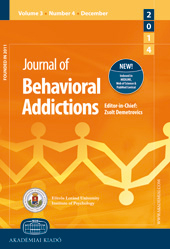The role of self-esteem in Internet addiction within the context of comorbid mental disorders: Findings from a general population-based sample
The role of self-esteem in Internet addiction within the context of comorbid mental disorders: Findings from a general population-based sample
Author(s): Katrin Sevelko, Gallus Bischof, Anja Bischof, Bettina Besser, Ulrich John, Christian Meyer, Hans-Jürgen RumpfSubject(s): Behaviorism
Published by: Akadémiai Kiadó
Keywords: Internet addiction; self-esteem; comorbidity; psychopathology; prevalence
Summary/Abstract: Background and aims: Internet Addiction (IA) has consistently been related to comorbid psychiatric disorders and lowered self-esteem. However, most studies relied on self-report questionnaires using non-representative samples. This study aims to analyze the relative impact of self-esteem and comorbid psychopathology with lifetime IA in a population-based sample of excessive Internet users using clinical diagnoses assessed in a personal interview. Methods: The sample of this study is based on a general population survey. Using the Compulsive Internet Use Scale, all participants with elevated Internet use scores were selected and invited to a follow-up interview. Current DSM-5 criteria for Internet gaming disorder were rephrased to apply to all Internet activities. Out of 196 participants, 82 fulfilled the criteria for IA. Self-esteem was measured with the Rosenberg’s Self-Esteem Scale. Results: Self-esteem is significantly associated with IA. For every unit increase in self-esteem, the chance of having IA decreased by 11%. By comparison, comorbidities such as substance-use disorder (excluding tobacco), mood disorder, and eating disorder were significantly more likely among Internet-addicted than in the non-addicted group. This could not be reported for anxiety disorders. A logistic regression showed that by adding self-esteem and psychopathology into the same model, self-esteem maintains its strong influence on IA. Discussion and conclusions: Self-esteem was associated with IA, even after adjustment for substance-use disorders, mood disorder, and eating disorder. Self-esteem and psychopathology should be considered in prevention, intervention measures, as well as in the conception of etiological models.
Journal: Journal of Behavioral Addictions
- Issue Year: 7/2018
- Issue No: 4
- Page Range: 976-984
- Page Count: 9
- Language: English

